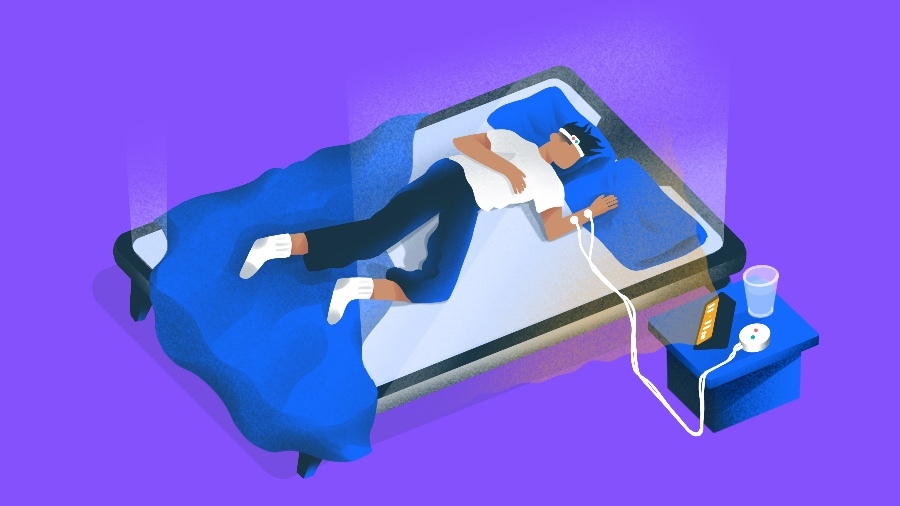Rise Science is turning sleep technology on its head. Rather than just give you data on your sleep, the RISE app shows you the peaks and valleys of your energy levels throughout the day, as well as how to improve sleeping habits to boost energy.
Subscribe to the Crunchbase Daily
The Chicago-based company, which focuses on energy management backed by sleep and circadian science research, announced $15.5 million in funding Wednesday that includes $10 million in new Series A funding led by Goodwater Capital, as well as a previous $5.5 million seed round with participation from Freestyle Capital, High Alpha and True Ventures.
Rise Science co-founder and CEO Jeff Kahn met his co-founder and CTO Leon Sasson in engineering school and founded the company in 2015. When Kahn began to feel exhausted, he went looking for solutions.
Kahn and Sasson ended up doing an apprenticeship in sleep study and learned about the two-process model of sleep regulation that RISE is based on. The model posits that circadian rhythm, which determines energy levels and the best biological time for sleeping, and sleep debt, which a person accrues when they get less than the right amount of sleep, are important for determining how a person feels and functions.
Their team’s research was published in an academic paper in 2011 and caught the eye of professional and college sports organizations.
“The elite sports world heard about this, and there I was, finishing graduate school and working with the New England Patriots and the Dallas Cowboys,” Kahn told Crunchbase News. “I would get phone calls from Bill Belichek to talk about how the team’s trends were for the week. It was crazy that we had convinced college and professional athletes to do something, which is get more sleep amongst everything else they could be doing.”

That’s when he said he started thinking about energy and started Rise Science. Here’s how it works: The app detects phone motion, such as when you touch it, and collects that behavioral data. It can also pull this historically and analyze sleep debt over time and tell you how much energy you are going to have, when you should take a break, have lunch, when your morning grogginess will end, a good time to finish work, and when to be sleeping.
The RISE app — officially launched Wednesday — is available for a yearly subscription of $60. Users can sign up for a seven-day free trial to find out their individual sleep needs, circadian rhythms and sleep debt.
Since launching the beta version of the RISE app in June of 2020, the company began seeing app installs increase to 20,000 to 30,000 per week.
Kahn intends to use the new funding to continue developing the app’s user experience, create additional tools and educational content, as well as hire more people.
Chi-Hua Chien, co-founder and managing partner at Goodwater Capital, a firm that focuses on consumer technology, said he found Rise Science interesting for its unique approach to sleep by focusing on energy.
He was also interested in the high retention rate the app was experiencing. Users were tapping into the data 14 out of 28 days to be informed about their energy throughout the day, said Chien, who is a RISE app user himself.
“I use it throughout the day to have a better sense of when to work out or when to go out for a walk, clear my head, or do hard thought work,” Chien said in an interview. “These are hard-core sleep science guys who worked with prominent professional sports teams. I was blown away by their approach. They understood this need because of their work with athletes who need to have peak performance to have a proper workout and to play their game.”
Meanwhile, the sleep technology space is a noisy one, Kahn said. Approximately $430 billion is spent each year on sleep aids by people trying to achieve optimal sleep. The global sleep economy is expected to grow to $585 billion by 2024, according to market and consumer data company Statista.
Indeed, since 2016, investors have pumped $2.1 billion into global companies focused on sleep technology and equipment via 312 deals, according to Crunchbase data.One of the largest raises so far this year was Finland-based sleep health tech wearable ŌURA Health, which raised $100 million in Series C funding in May.
Illustration: Dom Guzman

Stay up to date with recent funding rounds, acquisitions, and more with the Crunchbase Daily.



![Illustration of a guy watering plants with a blocked hose - Global [Dom Guzman]](https://news.crunchbase.com/wp-content/uploads/quarterly-global-3-300x168.jpg)
67.1K Followers